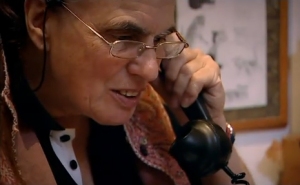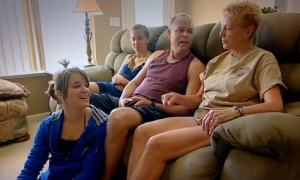Amanda Blue’s excellent Cutting Edge documentary The World’s Oldest Mums (Channel 4, 23rd July 2009) examined the cases of four women who were all at or near the age of 70 when the film was made.
Jenny Brown: 72 year old Jenny is “bursting to be a mother” and is seeking a clinic willing to help her to do so. The film shows her applying to, and being turned down by, the Bridge Centre in London and later trying to contact fertility specialists in Eastern Europe to fulfil her dream.

72 year old Jenny is seeking a clinic in the former Soviet Union willing to help her to have a child
Rajo Devi: Currently, the oldest mother in the world is 70 year old Indian Rajo Devi. Partly due to the social stigma associated with childlessness, India is becoming a major centre for the fertility treatment of older women; more than half of the 200 patients at one IVF clinic featured in the documentary are aged over 50.

Rajo Devi became a mother at 70 and (at the time of writing) is the oldest mother in the world
Mary Shearing: Interviews with 16 year old twins Amy and Kelly, reinforce the fact that fertility treatment to allow postmenopausal women per se is not a new phenomenon. The fact that their mother Mary Shearing has only recently turned 70, however, emphasises that the boundaries of possibility (and acceptability?) are certainly shifting.

Mary Shearing gave birth to twin daughters in November 1992 at the age of 53
Maria del Carmen Bousada de Lara: The saddest story in the documentary, concerns Maria del Carmen – saddest both in terms of the circumstances under which she came to find herself seeking fertility treatment, and the fact that she died a few weeks after the filming of her interview (see here for news report).

Maria died from ovarian cancer when her twin boys were 2 years old
With three brothers but no sister, Maria faithfully fulfilled the expected role and devoted much of her adult life to caring for her widowed mother. It was to Maria’s great misfortune that her mother lived to be over 100. It was only after this time that Maria felt able to seek fertility treatment, covertly flying to the USA and lying about her age to do so.
Is it right to give elderly women help to get pregnant?
What insights do these case offer regarding the ethics of helping post-menopausal women to have children? These four examples illustrate some of the arguments presented both in favour and in opposition to allowing fertility treatment for older women.
Arguments in favour
Advocates of fertility treatment for older women may argue in terms of individual autonomy, or may speak of rights, either rights to have a family per se, or more specifically under Article 8 of the Human Rights Act/European Convention of Human Rights, for the right to privacy. It is also possible to frame arguments in terms of the suffering of childlessness. In the case of Rajo Devi, it is clear that the stigma is greater; in her culture it is considered bad luck to encounter a barren woman on the street before lunchtime and in consequence her recent pregnancy has brought additional relief from ostracism (against this, it might be argued, we ought to challenge prejudice, not pander to it).
Advocates of treatment for older mothers may also highlight the unfair way in which women (in western culture, in particular) are villified for having families in their advanced years, whilst men who father children at equivalent ages are not judged in the same way, and may even by celebrated for their virility. Eric Clapton, for example had three daughters in his late 50s, and Rod Stewart‘s seventh child was born when he was 60.
Arguments against treatment
For many people there is an inherent ‘yuk’ factor regarding older mothers. How can this moral repugnance be substantiated? It has been argued that embarking on a family at extreme ages demonstrates gross selfishness. This, however, can be a misleading oversimplification. Whilst it may be the case that a woman has put career development before family (there is some evidence of this in the case of Jenny Brown, for example), there may be other reasons for the delay. As demonstrated in the case of Maria del Carmen, it was actually a lack of selfishness that resulted in her leaving it so late to start a family, since she had devoted her life to caring for her mother. Regardless of the motivation, Robert Winston is amongst several commentators warning women not to assume that IVF will routinely provide them with a family at a later stage (see Career women given ‘false optimism’ by fertility clinics).
Those opposed to fertility treatment for older women may argue that there are health risks for the mother, and risks that her children will likely lose their mum at a tender age. Taking each of these in turn; it is certainly true that becoming a mother late in one’s life can take a terrible toll on the body. Mary Shearing comes across as a remarkably active 70 year old – we see her in the film water-skiing and working out in the gym. She was, however, ‘only’ 53 when she had her twins. Rajo complains of ongoing stomach pains after the birth and, although it is not expressly suggested in the documentary, there may well be a connection between the fertility treatment received by Maria and her subsequent ovarian cancer.
Regarding the premature death of their mother, it is – of course – true that over the course of history mothers have generally died much earlier in the life of their children than is the norm today; indeed, many would have died during childbirth itself. Nevertheless, there does seem to be a qualitative difference between the possibility of a parent dying during your childhood and the likelihood that this will be the case. Maria’s case is a sad reminder of this reality.
Additionally, it may be stressed that donated oocytes are a relatively rare commodity within healthcare provision and since it is a biological truism that fertility treatment is less successful for older women than for younger, available eggs should be prioritised towards younger candidates.
If not age, what other criteria should be used to determine who gets the egg? Should priority be given to women who have not had children before? Several of the cited examples already had adult children, including Mary Shearing and Lynne Bezant. Should onset of the menopause be a cut-off point? If so, what about women who have early menopause (ie before 45) or even premature menopause (in women under 40) ?
Ability to pay is a likely factor, particularly since NICE (the UK National Institute for Clinical Excellence) has state that only women under 40 can receive fertility treatment paid for on the NHS, and some primary care trusts (e.g. Oxfordshire) have set a lower age threshhold for publicly funded treatment. Receipt of treatment on the basis of ability to pay is, of course, identified as a source of injustice against the poor.
Even private clinics may impose some age-related criteria. It is interesting to observe that both Liz Buttle and Maria del Carmen lied about their age to receive treatment, and other evidence suggests that they are not alone in this (see Thousands lie to IVF clinics in desperation to have baby). We must remember too that differences between one jurisdiction and another can lead to patients receiving treatment elsewhere, e.g. Maria going to America and Jenny’s attempt to follow Patricia Rashbrook and others in going to the former Soviet Union (see Older British women head abroad for IVF).
Cutting Edge: The World’s Oldest Mums was first broadcast on Channel 4 at 9 pm on Thursday 23rd July 2009. At the time of writing it is available via 4OD their catch-up service. BUFVC members can obtain a copy via their institutional representative in the usual way (TRILT ID: 0109BBFE).
(CJRW)



 Posted by Chris Willmott
Posted by Chris Willmott